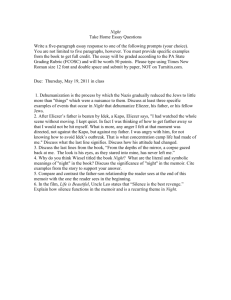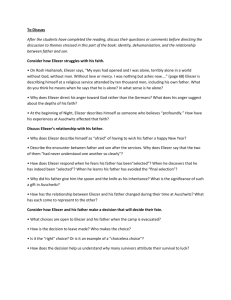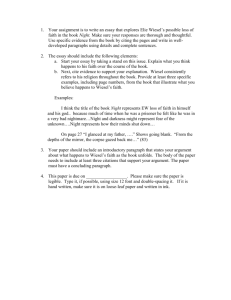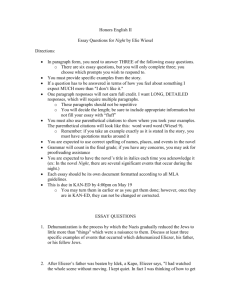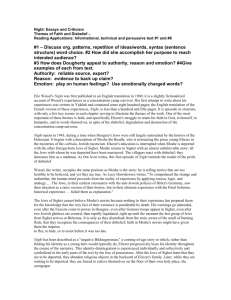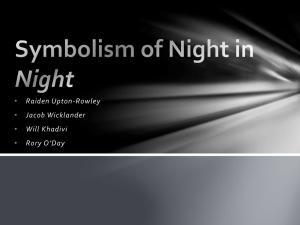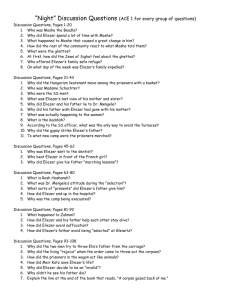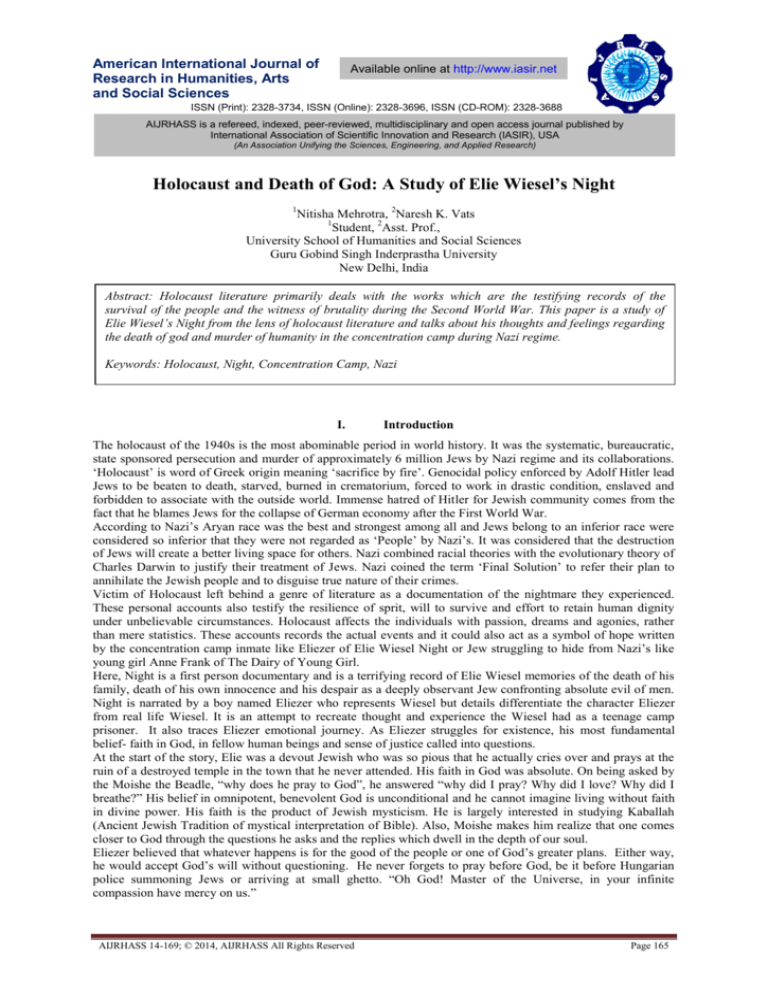
American International Journal of
Research in Humanities, Arts
and Social Sciences
Available online at http://www.iasir.net
ISSN (Print): 2328-3734, ISSN (Online): 2328-3696, ISSN (CD-ROM): 2328-3688
AIJRHASS is a refereed, indexed, peer-reviewed, multidisciplinary and open access journal published by
International Association of Scientific Innovation and Research (IASIR), USA
1.
(An Association Unifying the Sciences, Engineering, and Applied Research)
Holocaust and Death of God: A Study of Elie Wiesel’s Night
1
Nitisha Mehrotra, 2Naresh K. Vats
1
Student, 2Asst. Prof.,
University School of Humanities and Social Sciences
Guru Gobind Singh Inderprastha University
New Delhi, India
Abstract: Holocaust literature primarily deals with the works which are the testifying records of the
survival of the people and the witness of brutality during the Second World War. This paper is a study of
Elie Wiesel’s Night from the lens of holocaust literature and talks about his thoughts and feelings regarding
the death of god and murder of humanity in the concentration camp during Nazi regime.
Keywords: Holocaust, Night, Concentration Camp, Nazi
I.
Introduction
The holocaust of the 1940s is the most abominable period in world history. It was the systematic, bureaucratic,
state sponsored persecution and murder of approximately 6 million Jews by Nazi regime and its collaborations.
‘Holocaust’ is word of Greek origin meaning ‘sacrifice by fire’. Genocidal policy enforced by Adolf Hitler lead
Jews to be beaten to death, starved, burned in crematorium, forced to work in drastic condition, enslaved and
forbidden to associate with the outside world. Immense hatred of Hitler for Jewish community comes from the
fact that he blames Jews for the collapse of German economy after the First World War.
According to Nazi’s Aryan race was the best and strongest among all and Jews belong to an inferior race were
considered so inferior that they were not regarded as ‘People’ by Nazi’s. It was considered that the destruction
of Jews will create a better living space for others. Nazi combined racial theories with the evolutionary theory of
Charles Darwin to justify their treatment of Jews. Nazi coined the term ‘Final Solution’ to refer their plan to
annihilate the Jewish people and to disguise true nature of their crimes.
Victim of Holocaust left behind a genre of literature as a documentation of the nightmare they experienced.
These personal accounts also testify the resilience of sprit, will to survive and effort to retain human dignity
under unbelievable circumstances. Holocaust affects the individuals with passion, dreams and agonies, rather
than mere statistics. These accounts records the actual events and it could also act as a symbol of hope written
by the concentration camp inmate like Eliezer of Elie Wiesel Night or Jew struggling to hide from Nazi’s like
young girl Anne Frank of The Dairy of Young Girl.
Here, Night is a first person documentary and is a terrifying record of Elie Wiesel memories of the death of his
family, death of his own innocence and his despair as a deeply observant Jew confronting absolute evil of men.
Night is narrated by a boy named Eliezer who represents Wiesel but details differentiate the character Eliezer
from real life Wiesel. It is an attempt to recreate thought and experience the Wiesel had as a teenage camp
prisoner. It also traces Eliezer emotional journey. As Eliezer struggles for existence, his most fundamental
belief- faith in God, in fellow human beings and sense of justice called into questions.
At the start of the story, Elie was a devout Jewish who was so pious that he actually cries over and prays at the
ruin of a destroyed temple in the town that he never attended. His faith in God was absolute. On being asked by
the Moishe the Beadle, “why does he pray to God”, he answered “why did I pray? Why did I love? Why did I
breathe?” His belief in omnipotent, benevolent God is unconditional and he cannot imagine living without faith
in divine power. His faith is the product of Jewish mysticism. He is largely interested in studying Kaballah
(Ancient Jewish Tradition of mystical interpretation of Bible). Also, Moishe makes him realize that one comes
closer to God through the questions he asks and the replies which dwell in the depth of our soul.
Eliezer believed that whatever happens is for the good of the people or one of God’s greater plans. Either way,
he would accept God’s will without questioning. He never forgets to pray before God, be it before Hungarian
police summoning Jews or arriving at small ghetto. “Oh God! Master of the Universe, in your infinite
compassion have mercy on us.”
AIJRHASS 14-169; © 2014, AIJRHASS All Rights Reserved
Page 165
Nitisha Mehrotra et al., American International Journal of Research in Humanities, Arts and Social Sciences, 5(2), December 2013-February
2014, pp. 165-167
When rumors of Nazi’s crime first reached some of the outlying Jews towns, like Sighet, no one believed them.
The rabbis said “Nothing will happen to us, for God needs us”. The town felt that God was with them and would
protect them from anything as horrible as what the rumors suggested. They felt safe and secure in their faith.
“And we, the Jews of Sighet, were waiting for better days which would not long be coming now”.
In the concentration camps, some of the men spoke of God, his mysterious ways and the sins of Jewish people.
According to Akiba Drummer, “God is testing us; he wants to see whether we are capable of overcoming our
base instincts and killing the Satan within ourselves. We have no right to despair. And if he punishes us
mercilessly, it is a sign that he loves us that much more. (Wiesel, 45)
Faith delayed the revolution that might have erupted in the camps. The younger people felt that it would be
better to die fighting than to surrender like lambs for slaughter. They possessed knives and a strong will but their
elders reminded them “You must never lose faith, even within swords hangs over your head. That teaching of
our sages”. As long as the elders were willing to accept God’s will, the younger’s been willing to respect their
faith. They still had faith that God had a greater purpose in mind and though they opposed the idea of suffering,
they would suffer with pride as they felt they are part of the God’s larger framework. And so Eliezer and his
town were indoctrinated without incidents into the camps, believing that if their faith endured they would be
saved. Soon delusion faded and Eliezer began to doubt God.
It was not easy for Eliezer to doubt in the existence of God or he would not have held on to his faith such
tenacity. But, the meaningless violence inflicted upon the Jews was an enormous reason to shake his
indomitable faith. In the face of crematory pit, Eliezer notes, “For the first time I first revolt rise up in me; why
should I bless his name? The eternal, lord of the Universe, the All powerful and terrible was silent. What had to
thank him for?”(Wiesel, 35). He awoke to the idea that he was terribly alone in the world without God. Lack of
faith turned quickly to despair “If God would not save his children, who would?” No one believed the rumors of
peace and safety. In the hospital at Auschwitz, Wiesel met a man who was consumed with despair. He said “I
have got more faith in Hitler than in anyone else. He alone has kept his promises, all his promises to Jewish
people.” It shows that he finds hard to believe in God and what he was allowing to happen.
Though not complete at that moment, Eliezer loss of faith contrasts with continued faith of devout prisoners like
Akiba Drummer whose faith in divine redemption raises the spirit of the prisoners.
The tormenting scene when a child is murdered symbolizes the murder of God. Eliezer comes to believe that a
just God must not exist in a world where an innocent child can be hanged on gallows, “where is he?” Eliezer
asks rhetorically and then answers, “He is hanging, here on this gallows”. Upon witnessing the hanging of the
child, Eliezer reaches a low point in his faith. The death of the innocent child represents the death of the
Eliezer’s own innocence. In the camp, he has become an entirely different person from the child he was at the
beginning of the Holocaust. He has not only lost his faith but is also beginning to lose his sense of morals and
values. He now struggles to survive in a world in which survival has become Eliezer’s dominant goal. Eliezer
who before his arrival in the concentration camps celebrated with zest every Jewish festival, who for years
awaited the coming of Messiah. Now, the same Eliezer on the occasion of Yom Kippur decides to eat. The day
on which Jews traditionally fast in order to atone their sins.
At the end of the summer of 1944, the Jewish high holidays arrive, Rosh Hassanah: the celebration of the New
Year. Despite their imprisonment and in state of their great suffering and distress, the Jews of buna come
together to celebrate Rosh Hassanah, praying together and praising God’s name on this Jewish holiday. Eliezer’s
religion rebellion intensifies and he cannot find the reason to bless God in the midst of such extreme suffering.
Eliezer’s mocks the idea that Jews are God’s chosen people deciding that they have only been chosen to be
massacred. He starts believing that men are stronger than God and is more spirited and more forgiving. His
denial of faith leaves him alone.
In case of Akiba Drummer, having lost his faith, he loses his will to live and does not survive the selection.
Thus, other inmates are also beginning to lose their faith. Eliezer also tells of devout Rabbi who confesses that
he can no longer believe in God after what he has seen in concentration camps.
In the Jewish tradition, the High Holidays are considered as the time of divine judgments. According to Siddur
(Jewish Prayer Book), Jews pass before God on Rosh Hassanah and God determines that who will live and who
will die in the coming year. Elizer believes that a role reversal has taken place. Soon after Rosh Hassanah, the
SS performs a selection on the prisoners at Buna. Eliezer has decided that Nazi action means that God is not
present in the concentration camps and praying to him is foolish.
Eliezer’s loss of faith comes to mean betrayal not just of God, but also on his fellow human beings and on his
own humanity. Yet even in rejecting God, Eliezer and his fellow Jews cannot erase God from their
consciousness. Although Akiba Drummer, loses his faith in God he requests Eliezer that he should recite the
Kaddish on his behalf. It clearly shows religion still holds some power on him. Similarly, Eliezer having
rejected his faith in God forever still refers to God’s existence while making his oath never to forget Holocaust
“Even if I am condemned to live as long as God himself”. Eliezer accuses God who allow six crematories to
devour Jews days and nights, Sunday and feast days” Why, but why should I bless him? How could I say to
AIJRHASS 14-169; © 2014, AIJRHASS All Rights Reserved
Page 166
Nitisha Mehrotra et al., American International Journal of Research in Humanities, Arts and Social Sciences, 5(2), December 2013-February
2014, pp. 165-167
him? Blessed Art Thou! Eternal! Master of the Universe, who chose from us among the races to be tortured day
and night to see our father, our mother, and our brother in the crematory?”
Along with Eliezer faith in God, his faith also shakes in the goodness of the world. His faith is equally shaken
by the cruelty and selfishness he witnesses among the prisoners. Eliezer began to doubt on his own humanity,
the beginning of loss of faith in man. When Kapo beats his father, Eliezer wonders at the transformation he had
himself undergone. Only a day before he would have attacked the Kapo. Now, however he remains guilty silent.
Moral tragedy of Holocaust is not the death of faith of God but also death of faith in humankind. Not only does
God fail to act justly and to save Jews from cruel Nazis. The Nazi’s also drive Jews into cruelty. He fears that
inhumanity and brutality of concentration camps does not let him lose his filial responsibility and kindness that
he may turn against his father to facilitate his survival, “I was a body perhaps less than that even the starved
stomach. The stomach alone was aware of passage of time.”
In his autobiography,” All Rivers Run to the Sea”, Wiesel speaks at a far greater length about his religious
feelings after Holocaust. ‘My anger rises up within Faith and not outside. I had seen too much suffering to break
with the past and reject heritage of those who had offered.” Eliezer had been a witness to the ultimate evil; he has
lost faith in God and in humanity. The final line in which Eliezer look at himself in the mirror and sees a ‘corpse’
suggests that Eliezer’s survival is luck and also shows his positive sprit and will to fight. It seems to Eliezer that
without hope and faith, after having seen the unimaginable, he might as well be dead.
References
[1].
Never Shall I Forget That Night, [http://www.yadvashem.org/yv/en/exhibitions/wiesel/]
[2].
Holocaust Index [http://www.historylearningsite.co.uk/holocaust_index.htm]
[3]. JVL [http://www.jewishvirtuallibrary.org/#]
[4].
Night by Elie Wiese
AIJRHASS 14-169; © 2014, AIJRHASS All Rights Reserved
Page 167

